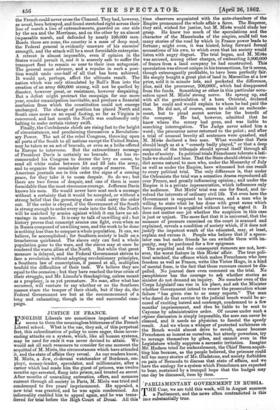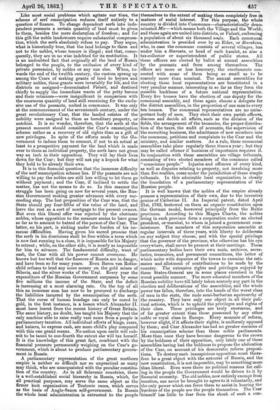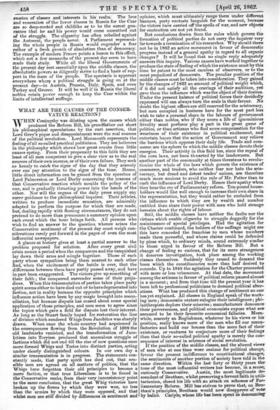Like most social problems which agitate our time, the scheme
of serf emancipation reduces itself entirely to a question of finance. To change dependent serfs into inde- pendent peasants a certain quantity of land mast be given to them, besides the mere declaration of freedom ; and for this gift the noble landowners require substantial compensa- tion, which the serfs absolutely refuse to pay. They argue, what is historically true, that the land belongs to them and not to the nobles, whose tenure is illegal; and that, conse- quently, they are in no wise indebted for its restitution. It is an undoubted fact that originally all the land of Russia belonged to the people, to the exclusion of every kind of private possession, by nobles or any one else. When, to- wards the end of the twelfth century, the custom sprang up among the Czars of making grants of land to boyars and military nobles, these grants were invariably for life, and the districts so assigned—denominated volosti, and destined chiefly to supply the immediate wants of the petty barons and their retainers—were insignificant in comparison with the enormous quantity of land still remaining for the exclu- sive use of the peasants, united in communes. It was only at the commencement of the seventeenth century, under the great revolutionary Czar, that the landed estates of the nobility were assigned to them as hereditary property, or votchini. It is no wonder, therefore, that the serfs at the present moment should consider the Czar's emancipation scheme rather as a recovery of old rights than as a gift of new privileges. In spite of the efforts made by the Go- vernment to induce them to consent, if not to an actual at least to a prospective payment for the land which is made over to them as individual property, the serfs have not given way an inch in their opposition. They will lay their lives down for the Czar; but they will not pay a kopeck for what they hold to be already their own. It is in this financial question that the immense difficulty of the serf emancipation scheme lies. If the peasants are not willing to pay the nobles are still less willing to let them go without payment ; and the Czar, if inclined to settle the matter, has not the means to do so. In this manner the struggle has been going on now for several years, the Rus- sian Government making greater advances with every suc- ceeding step. The last proposition of the Czar was, that the State should pay four-fifths of the value of the land, and leave the rest as a sort of mortgage to the present owners. But even this liberal offer was rejected by the obstinate nobles, whose opposition to the measure seems to have gone so far as to amount to hatred of the person of the Czar. The latter, on his part, is sinking under the burden of his im- mense dculties. Having given his sacred promise that the serfs in his dominions shall be free within a term which is now fast running to a close, it is impossible for his Majesty to retreat ; while, on the other side, it is nearly as impossible for him to advance. The fundamental difficulty, want of cash, the Czar with all his power cannot overcome. He knows but too well that the finances of Russia are in danger, and have been so for many years. Even Baron von Roths- child refuses to lend any more money on the gold mines of Siberia, and the silver works of the Ural. Every year the expenditure of the Russian Government surpasses by some five millions the income of the State, and the deficit is increasing at a most alarming rate. On the top of all this an immense sum has now to be procured to discharge the liabilities incurred by the emancipation of the serfs. That the curse of human bondage can only be cured by gold, in the first instance, is a lesson which Alexander II. must have learnt from the recent history of Great Britain. The same history, no doubt, has taught his Majesty that the only machine able to raise really vast sums from a people is parliamentary taxation. All individual efforts of kings, czars, and kaisers, to express cash, are mere child's play compared with this one grand means. No nation upon earth will sub- mit to be taxed to one-fourth the extent she will tax herself. It is the knowledge of this great fact, combined with the financial pressure permanently weighing on the Czar's go- vernment, which is about to produce parliamentary govern- ment in Russia.
A parliamentary representation of the great northern empire is neither so difficult nor so unpractical as many may think, who are unacquainted with the peculiar constitu- tion of the country. As in all Sclavonic countries, there IS a well-established social hierarchy in Russia, which, for all practical purposes, may serve the same object as the firmer knit organization of Teutonic races, which serves as the basis of Anglo-Saxon self-government. In Russia the whole local administration is entrusted to the people themselves to the extent of making them completely free in matters of social interest. For this purpose, the whole- country is divided into Communes—characteristically deno- minated Mir—which means both the Village and the World; and these again are united into districts or Volooti, embracing a population of about six thousand souls. Each communal administration is presided over by an Elder, or Starshiaa, who, in case the commune consists of several villages, has under him a Starosta, or head of each hamlet, as also a tax-collector or superintendent of public stores. All these officers are elected by ballot at annual assemblies by the peasants and from among themselves. The offices are more or less honorary, the emoluments con- nected with some of them being so small as to be scarcely more than nominal. The annual assemblies for electing these local representatives are bonstituted in a very peculiar manner, interesting in so far as they form the possible backbone of a future national representation. Every five houses have the election of one deputy for the communal assembly, and these again choose a delegate for the district assemblies, in the proportion of one man to every ten houses. The communal representatives are no unim- portant body of men. They elect their own parish officers, discuss and decide all affairs, such as the division of the fields, the arrangement of the tenancies, the proper distribu- tion of the taxes, the audit of accounts, the supervision of the recruiting business, the admittance of new members into the commune, petitions and complaints to the Czar and the ministry, and similar matters. As a rule, these communal assemblies take place regularly three times a year ; but they may be called oftener if business of importance requires it. In conjunction with these assemblies are village tribunals, consisting of two elected members of the commune called "conscience people." Injuries and offences of every kind, as well as disputes relating to property, not involving more than five roubles, come under the jurisdiction of these simple tribunals. In this admirable local organization is clearly the foundation of a parliamentary representation of the Russian people. It is well known that the nobles of the empire already possess a representation of their own, due to the inventive genius of Catherine II. An Imperial patent, dated April 21st, 1785, bestowed on them an organic constitution upon the German model, borrowed principally from the Baltic provinces. According to this Magna Charta, the nobles living in each province form a corporation under an elected president, or/marshal, to whom is joined a government com- missioner. The members of this corporation assemble at regular intervals of three years, with liberty to deliberate on any subject they choose, and with the special privilege that the governor of the province, who otherwise has his eye everywhere, shall never be present at their meetings. These parliamentary bodies have their own seals, archives, secre- taries, treasuries, and permanent committees, the latter of which unite with deputies of the towns to examine the esti- mates and allotment of contributions to be made by the country. The extensive rights and privileges enjoyed by these States-General are in some places exercised in the worst possible manner. The more educated members of the Russian nobility have till lately taken scarcely any part in the election and deliberations of the assemblies and the whole power has fallen, therefore, into the hands of the worst class of men in the state, the rude semi-barbarian squirearchy of the country. They have only one object in all their poli- tical actions, which is to uphold the privileges and rights of their class. These privileges are truly enormous, and of far greater extent than those possessed by any other noble or royal class in Europe. Every measure of reform, however slight, if it affects their rights, is uniformly opposed by them; and Czar Alexander has had no greater enemies of his emancipation scheme than these noble parliaments. More than once they have become dangerous to the crown by the boldness of their opposition, only lately one of these assemblies having bad the boldness to propose the abdication of the Czar, on account of his democratic reform proposi- tions. To destroy such inauspicious opposition must there- fore be a great object with the autocrat of Russia, and the , new constitution, it is not impossible, may be something more than liberal. Even were there no political reasons for call- ing in the people the Government would be driven to it by financial necessity. The old nobles, now entirely exempt from taxation, can never be brought to agree to it voluntarily, and the only power which can force them to assist in bearing the burdens of the people are the people themselves. The Czar himself has little to fear from the shock of such a con-, mission of dames and interests in his realm. The love and veneration of the lower classes in Russia for the Czar are so deep-rooted and childlike sac to be the surest gua- rantee that he and his power would come unscathed out of the struggle. The oligarchy has often rebelled against the Autocrat, the people never. A Parliament represent- ing the whole people in Russia would engender a fear rather of a fresh growth of absolutism than of democracy. The example of modern France points a lesson to this effect, which not a few monarchs of the present day seem to have made their study. While all the liberal Governments of the present day rest essentially upon the middle classes, the absolutistic powers as diligently strive to find a basis of sup- port in the mass of the people. The spectacle is apparent everywhere wheria, a political struggle is going on at the present day—in Austria, Prussia, Italy, Spain, and even Turkey and Greece. It will be well if in Russia the liberal nobles retain power enough to keep the Czar within the limits of intellectual suffrage.
































 Previous page
Previous page